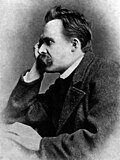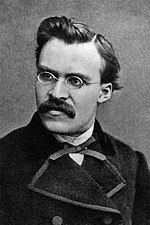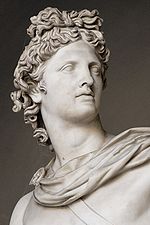Friedrich Nietzsche (1844–1900) developed his philosophy during the late 19th century. He owed the awakening of his philosophical interest to reading...
96 KB (12,832 words) - 23:25, 12 November 2024
The Philosophy of Friedrich Nietzsche is a book by H. L. Mencken, the first edition appearing in 1908. The book covers both better- and lesser-known areas...
3 KB (326 words) - 11:08, 1 November 2024
Übermensch (redirect from Superman (Nietzsche))
concept in the philosophy of Friedrich Nietzsche. In his 1883 book, Thus Spoke Zarathustra (German: Also sprach Zarathustra), Nietzsche has his character...
17 KB (2,122 words) - 20:50, 20 October 2024
God is dead (redirect from Nietzsche is dead)
as the death of God) is a statement made by the German philosopher Friedrich Nietzsche. The first instance of this statement in Nietzsche's writings is...
22 KB (3,029 words) - 22:13, 14 November 2024
The Friedrich Nietzsche Prize or Friedrich-Nietzsche-Preis is a German literary award named after Friedrich Nietzsche and awarded by the state of Saxony-Anhalt...
6 KB (398 words) - 15:09, 12 August 2022
Amor fati (category Philosophy of Friedrich Nietzsche)
doctrine on the subjugation of all events to fate Nietzschean affirmation – Concept in the philosophy of Friedrich Nietzsche Thus Spoke Zarathustra – Philosophical...
9 KB (1,158 words) - 16:22, 21 August 2024
Friedrich Nietzsche's views on women have attracted controversy, beginning during his life and continuing to the present. Ida von Miaskowski was the wife...
11 KB (1,420 words) - 17:38, 25 October 2024
Friedrich Wilhelm Nietzsche (15 October 1844 – 25 August 1900) was a German classical scholar, philosopher, and critic of culture, who became one of the...
208 KB (23,213 words) - 08:18, 14 November 2024
Nietzsche and Philosophy (French: Nietzsche et la philosophie) is a 1962 book about Friedrich Nietzsche by the philosopher Gilles Deleuze, in which the...
10 KB (1,148 words) - 08:40, 24 October 2024
Will to power (category Philosophy of Friedrich Nietzsche)
Wille zur Macht) is a concept in the philosophy of Friedrich Nietzsche. The will to power describes what Nietzsche may have believed to be the main driving...
31 KB (4,394 words) - 11:07, 21 October 2024
Egoism (category Philosophy of life)
sociology, though, for example, this is not present in the philosophy of Friedrich Nietzsche. The term egoism is derived from the French égoïsme, from...
27 KB (3,323 words) - 06:40, 23 October 2024
This is a list of writings and other compositions by Friedrich Nietzsche. Aus meinem Leben, 1858 (From My Life) Über Musik, 1858 (On Music) Napoleon III...
27 KB (3,005 words) - 20:25, 26 October 2024
conditions of their possibility (particularly in Michel Foucault's genealogies). It has been developed as a continuation of the works of Friedrich Nietzsche. Genealogy...
7 KB (884 words) - 16:57, 24 July 2024
The ideas of the 19th century German philosophers Max Stirner (dead in 1856) and Friedrich Nietzsche (born in 1844) have been compared frequently. Many...
40 KB (5,523 words) - 01:35, 13 August 2024
Nietzschean affirmation (redirect from Affirmation of life)
scholarly identified in the philosophy of Friedrich Nietzsche. An example used to describe the concept is a fragment in Nietzsche's The Will to Power: Suppose...
7 KB (1,019 words) - 02:25, 24 October 2024
The Four Great Errors (category Philosophy of Friedrich Nietzsche)
are four mistakes of human reason regarding causal relationships that the German philosopher Friedrich Nietzsche argues are the basis of all moral and religious...
7 KB (1,053 words) - 18:20, 2 June 2024
19th-century philosopher Friedrich Nietzsche is known as a critic of Judeo-Christian morality and religions in general. One of the arguments he raised...
39 KB (5,570 words) - 23:12, 30 August 2024
as Thus Spake Zarathustra, is a work of philosophical fiction written by German philosopher Friedrich Nietzsche; it was published in four volumes between...
41 KB (5,123 words) - 10:16, 16 November 2024
revaluation of all values or transvaluation of all values (German: Umwertung aller Werte) is a concept from the philosophy of Friedrich Nietzsche. The Revaluation...
1 KB (120 words) - 01:17, 7 August 2023
will to power is a prominent concept in the philosophy of Friedrich Nietzsche and in the psychotherapy of Alfred Adler. The term may also refer to: The...
915 bytes (147 words) - 21:18, 3 June 2024
Perspectivism (category Philosophy of Friedrich Nietzsche)
philosophies of Protagoras, Michel de Montaigne, and Gottfried Leibniz. However, its first major statement is considered to be Friedrich Nietzsche's development...
33 KB (3,777 words) - 11:54, 21 November 2024
Friedrich Nietzsche's influence and reception varied widely and may be roughly divided into various chronological periods. Reactions were anything but...
43 KB (5,874 words) - 17:30, 29 October 2024
Apollonian and Dionysian (category Philosophy of Friedrich Nietzsche)
figures of Apollo and Dionysus from Greek mythology. Its popularization is widely attributed to the work The Birth of Tragedy by Friedrich Nietzsche, though...
9 KB (1,664 words) - 19:08, 29 May 2024
Max Stirner (redirect from Philosophy of Max Stirner)
Stirner and Nietzsche, Paris, 1904; Robert Schellwien, Max Stirner and Friedrich Nietzsche, 1892; H.L. Mencken, The Philosophy of Friedrich Nietzsche, 1908;...
76 KB (9,412 words) - 11:06, 2 November 2024
Last man (category Philosophy of Friedrich Nietzsche)
Mensch) is a term used by the philosopher Friedrich Nietzsche in Thus Spoke Zarathustra to describe the antithesis of his theorized superior being, the Übermensch...
5 KB (609 words) - 02:34, 22 November 2024
New Philosophers (redirect from New Philosophy)
thinker Jean-Paul Sartre and the concept of post-structuralism, as well as the philosophy of Friedrich Nietzsche and Martin Heidegger. They include Alain...
5 KB (584 words) - 18:15, 20 November 2024
Nietzsche: A Philosophical Biography (German: Nietzsche. Biographie seines Denkens) is a biography of the German philosopher Friedrich Nietzsche, written...
2 KB (132 words) - 08:41, 5 November 2024
Human, All Too Human (category Books by Friedrich Nietzsche)
Ein Buch für freie Geister) is a book by 19th-century philosopher Friedrich Nietzsche, originally published in 1878. A second part, Assorted Opinions and...
22 KB (2,720 words) - 03:25, 24 October 2024
Eternal return (redirect from Eternal return of the same)
Wiederkunft) is one of the central concepts of the philosophy of Friedrich Nietzsche (1844–1900). While the idea itself is not original to Nietzsche, his unique...
27 KB (3,433 words) - 01:10, 21 November 2024
Friedrich Nietzsche. The novel is a review of the history of philosophy and psychoanalysis and some of the main personalities of the last decades of the...
4 KB (525 words) - 16:40, 24 August 2024







